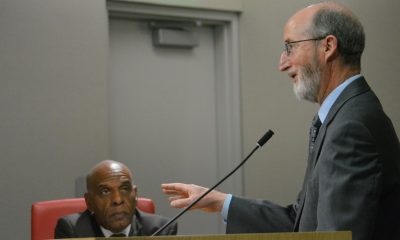California Black Media
Cinco De Mayo: Five Interesting Facts You Should Know About the Popular Mexican American Holiday
To explore the historical significance of Cinco De Mayo, we step back to the origins of the commemoration, share how some Mexican American Californians regard it and trace how it has morphed into the celebrations we see today.

By Edward Henderson, California Black Media
To explore the historical significance of Cinco De Mayo, we step back to the origins of the commemoration, share how some Mexican American Californians regard it and trace how it has morphed into the celebrations we see today.
Celebrations in the United States began in 1862 in Columbia, California, a small town located in the foothills of the Sierra Nevada in Tolumne County, according to that town’s website.
Today, millions of Americans celebrate Cinco De Mayo annually with 120 official celebrations organized across the United States.
This day has become a cultural point of pride for Mexican Americans and other Latino communities in the United States. It serves as a time to affirm and celebrate their cultures with other Americans of all backgrounds as they highlight their contributions to American history and society.
Joseph Soltero, a Mexican American living in Escondido, shared his perspective on Cinco de Mayo with California Black Media. He learned about Cinco De Mayo from his grandfather and talked about the extent to which his family and San Diego County community celebrate the holiday.
“We knew September 16 was really Mexican Independence Day, but kids in my school would always mistake Cinco De Mayo as our Independence Day. [Cinco De Mayo] is not really even a Mexican holiday,” said Soltero. “It’s something people do to have an excuse to buy drinks, have fun and spend a little money at taco shops.”
Like Soltero, many Mexican Americans (and other Latino Californians) do not take the support and solidarity they receive from people of other races on Cinco De Mayo for granted. They also appreciate when people take the time to learn about the cultural significance of the day and avoid some of the cultural tropes that can easily whisper undertones of racism.
To help raise your awareness about the origins and cultural significance of the day, here are 5 little known facts about Cinco De Mayo:
- Cinco De Mayo is not Mexican Independence Day. It is the anniversary of the Battle of Puebla. This military victory on May 5, 1862, over the French forces of Napoleon III was hailed as a symbol for Mexican resistance to foreign influence.
- The holiday was not given much historical significance outside of Puebla, and it has not been celebrated on a large scale in Mexico. However, during the Civil War, Mexican Americans in California, Oregon and Nevada who supported the Union drew inspiration from the victory over the French-backed Confederate forces.
- The Chicano civil rights movement in the 1940s gave a new energy to celebration of the holiday in the United Sates as a symbol of national pride.
- In the 1980s and 1990s, beer companies’ marketing strategies targeted Mexican Americans by encouraging them to celebrate their heritage – and Cinco De Mayo –with Coronas, Bud Light, and Dos Equis. This created the perceived connection between Cinco De Mayo, alcohol, and merrymaking.
- Los Angeles hosts the largest Cinco De Mayo celebration in the country.
As we join Mexican American Californians to celebrate Cinco De Mayo next week, let’s deepen our cultural understanding.
Let’s use this occasion to commit to learning more about our neighbors, colleagues and friends of other races and ethnicities.
This resource is supported in whole or in part by funding provided by the State of California, administered by the California State Library in partnership with the California Department of Social Services and the California Commission on Asian and Pacific Islander American Affairs as part of the Stop the Hate program. To report a hate incident or hate crime and get support, go to CA vs Hate.
California Black Media
Expect to See a New Flat Rate Fee of $24 on Your Electricity Bill
Last week, members of the California Public Utilities Commission voted to approve adding a $24.15 flat fee to monthly utility bills starting next year. On May 9, the California regulators took the unanimous vote in favor of the proposal which also reduced the cost of utilities per kilowatt hour but added the fixed charge to mitigate the loss. The new charge will be based on income with lower-income households paying between $6 to $12. Middle-class to high-income households will be expected to pay the full amount.

By California Black Media
Last week, members of the California Public Utilities Commission voted to approve adding a $24.15 flat fee to monthly utility bills starting next year.
On May 9, the California regulators took the unanimous vote in favor of the proposal which also reduced the cost of utilities per kilowatt hour but added the fixed charge to mitigate the loss. The new charge will be based on income with lower-income households paying between $6 to $12. Middle-class to high-income households will be expected to pay the full amount.
CPUC President Alice Reynolds and environmental groups argue that the new rate encourages people to use more clean energy and assist in modernizing the grid.
“We’re marching towards the future we want to see; we want this load growth,” Reynolds said.
“One where we can replace gas-guzzling cars on our roads with EVs that run on clean electricity and emit less pollutants,” she added.
Although the fixed charge is supposed to lower the utility bill for residents, opponents of the charge argue that a flat rate increases the monthly bill for middle and high-income households.
California currently operates under a prepaid model and maintenance of the power grid is included in the overall usage rate. But with this new proposal, residents will pay more than double the national average of $11 for electricity.
Cynthia Martinez, a spokesperson for the Predictable Power Coalition, an advocacy group, argued that a flat rate is more equitable and will reduce the cost of utilities for struggling families.
“For people who live in hotter climates, who really have no choice but to run their air conditioning more often, they’re paying higher costs that go toward grid upkeep,” Martinez said.
In the past, Democrats stalled plans at the state Capitol to approve the flat fee. All 14 Democrats in the Senate Energy, Utilities, and Communications Committee abstained from voting during a hearing on the proposal to roll back the flat rate.
California Black Media
Commentary: Support Early Detection Technology to Save the Lives of Black Cancer Patients
In 2008, I received news no one ever wants to hear. I was diagnosed with Stage I breast cancer, with an ER/PR positive tumor type. The road to recovery was tough, taking more than a physical toll on my body. I grappled with the emotional and mental strain of navigating a health care system that too often fails to address the unique needs of Black women. There was no manual to guide me through this journey, no prescription to ease the burden, and no roadmap to help me navigate the challenges ahead.

By Rhonda Smith, Special to California Black Media Partners
In 2008, I received news no one ever wants to hear. I was diagnosed with Stage I breast cancer, with an ER/PR positive tumor type.
The road to recovery was tough, taking more than a physical toll on my body. I grappled with the emotional and mental strain of navigating a health care system that too often fails to address the unique needs of Black women. There was no manual to guide me through this journey, no prescription to ease the burden, and no roadmap to help me navigate the challenges ahead.
The stark reality that Black women are 41% more likely to die from breast cancer than White women is a grim reminder of the systemic inequities that pervade our health care system. According to the American Cancer Society, Black Americans have the highest death rate and shortest survival rate of any racial or ethnic group in the country. This disparity extends beyond breast cancer, impacting colorectal, prostate, and lung cancers, among others.
To help overcome these inequities, we need to attack cancer at its roots; we must catch it early, and we must ensure the means to catch cancer early are accessible to the communities most at risk. I consider myself fortunate to have received a Stage 1 diagnosis. Yet, it pains me to know that for many others, their breast cancer is often detected in later, more advanced stages.
Fortunately, there is hope on the horizon. Some California congressmembers — particularly U.S. Rep. Raul Ruiz (D-CA-25) — are taking decisive action. Ruiz is a lead sponsor of a bill to dramatically expand access to cutting-edge early detection tools for Medicare beneficiaries, including millions of Black Americans in underserved communities. With bipartisan support, this bill is closer than ever to passage.
Named in honor of Nancy Gardner Sewell, a civil rights leader and passionate advocate for health justice, the Nancy Gardner Sewell Medicare Multi-Cancer Early Detection Screening Coverage Act would ensure Medicare has the latitude it needs to cover an exciting new class of cancer detection tests as soon as they’re cleared by the FDA.
These tests utilize the latest scientific achievements to identify cancer signals in a patient’s blood stream. They can pinpoint many different types of cancer from a single blood draw, dramatically improving doctors’ ability to detect cancers early and at stages where they are most treatable.
The next phase of our fight against cancer – and the disproportionate toll it takes on Black Americans – starts by urging Congress to pass the Nancy Gardner Sewell Medicare Multi-Cancer Early Detection Screening Coverage Act and ensuring the benefits of this legislation reach all corners of our communities.
I don’t advocate for change for myself, but for every Black woman who has faced, or will face, a similar battle.
Together, we can rewrite the narrative of health care, catch and treat cancer early, and ensure that every woman has the opportunity to thrive, regardless of her race or background.
About the Author
Rhonda Smith, Executive Director of the California Black Health Network, leads initiatives to advance health equity for Black Californians, leveraging her expertise from roles including consulting and spearheading health disparities initiatives for BIPOC communities. With an MBA from the University of Virginia’s Darden School of Business and a B.S. in Civil Engineering from Virginia Tech, Rhonda has led transformative projects like the LiveHealthy OC Initiative and the Susan G. Komen® Circle of Promise California Initiative to address health disparities and promote whole person care approaches.
Bay Area
California Makes Strides in Fight Against Fentanyl
California National Guard’s Counterdrug Task Force has seized over 7,000 pounds of fentanyl including 3.4 million pills since the state launched a multi-agency operation in January 2024. Gov. Gavin Newsom announced the state’s progress on May 7, National Fentanyl Awareness Day. The Governor said he deployed the state’s highway patrol and National Guard personnel last year as part of a public safety operation in partnership with local government officials and law enforcement.

By California Black Media
California National Guard’s Counterdrug Task Force has seized over 7,000 pounds of fentanyl including 3.4 million pills since the state launched a multi-agency operation in January 2024.
Gov. Gavin Newsom announced the state’s progress on May 7, National Fentanyl Awareness Day.
The Governor said he deployed the state’s highway patrol and National Guard personnel last year as part of a public safety operation in partnership with local government officials and law enforcement.
“As we recognize the serious dangers of illegal fentanyl, California is continuing to tackle this issue head-on. Our efforts are getting this poison off our streets and out of our communities as we continue to support people struggling with substance use.” Newsom said.
CalGuard Major General Matthew Beevers said that the state’s unprecedented investment in the Counterdrug Task Force has immobilized operations and revenue channels of transnational criminal organizations.
“The CalGuard is committed to supporting our state, federal, local and tribal law enforcement partners to eliminate the scourge of fentanyl,” Beevers said.
In the past five years, California has invested $1.1 billion in operations and initiatives to fight crime, support local law enforcement, and improve public safety. The Newsom administration has implemented a comprehensive approach as part of the governor’s Master Plan to tackle the fentanyl and opioid crisis.
The Newsom administration has expanded efforts to improve public safety across the state where operations occurred in cities such as San Francisco, Oakland, and Bakersfield.
San Francisco Mayor London Breed acknowledged that joint operation was a step in the right direction toward curbing illegal activity and improving public safety.
“Our coordinated work to shut down drug markets in San Francisco is making a difference, but we have more work to do,” Breed said.
“Together we are sending a message at all levels of government that anyone selling fentanyl in this city will be arrested and prosecuted,” she said.
-

 City Government2 weeks ago
City Government2 weeks agoCourt Throws Out Law That Allowed Californians to Build Duplexes, Triplexes and RDUs on Their Properties
-

 Activism3 weeks ago
Activism3 weeks agoOakland Post: Week of April 24 – 30, 2024
-

 Community4 weeks ago
Community4 weeks agoOakland WNBA Player to be Inducted Into Hall of Fame
-

 Community4 weeks ago
Community4 weeks agoRichmond Nonprofit Helps Ex-Felons Get Back on Their Feet
-

 Community4 weeks ago
Community4 weeks agoRPAL to Rename Technology Center for Retired Police Captain Arthur Lee Johnson
-

 Alameda County2 weeks ago
Alameda County2 weeks agoAn Oakland Homeless Shelter Is Showing How a Housing and Healthcare First Approach Can Work: Part 1
-

 Business4 weeks ago
Business4 weeks agoBlack Business Summit Focuses on Equity, Access and Data
-

 Bay Area4 weeks ago
Bay Area4 weeks agoMAYOR BREED ANNOUNCES $53 MILLION FEDERAL GRANT FOR SAN FRANCISCO’S HOMELESS PROGRAMS

















































